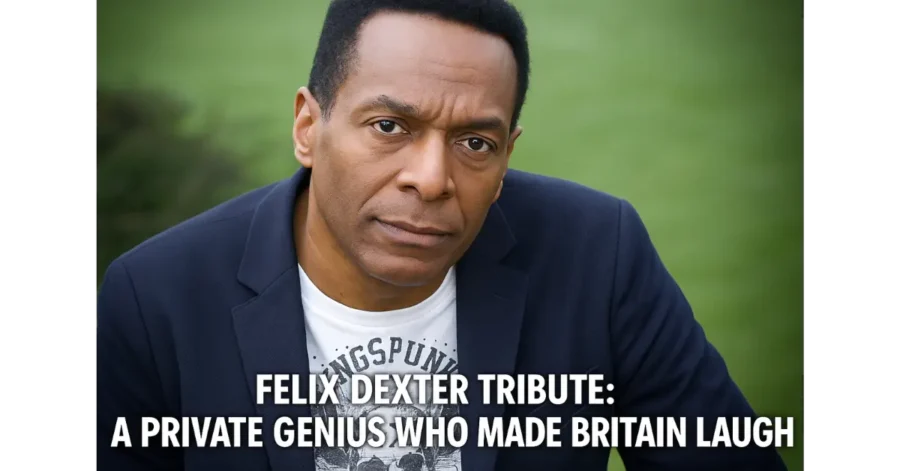
Felix Dexter Tribute: A Private Genius Who Made Britain Laugh
Few comedians have the power to blend sharp social commentary with effortlessly natural humour quite like Felix Dexter. To speak of Felix is to remember a man who, despite his relatively private nature, shaped British comedy in ways that still resonate today. As we mark his legacy, it’s clear that Felix was more than a comedian—he was a cultural pioneer, a mischievous chameleon, and above all, a quietly brilliant storyteller.
In this Felix Dexter tribute, we journey through the life, work, and enduring impact of the man who elevated British black comedy with wit, warmth, and wisdom.
From Saint Kitts to Surrey: Early Life and Unexpected Beginnings
Born on 26 July 1961 in Saint Kitts, Dexter’s early years were far from the stages of London comedy clubs where he’d later captivate audiences. At seven, his family moved to Surrey, England—a relocation that would bring profound changes to his life trajectory.
Despite studying law at University College London and training to become a barrister, Felix’s natural inclination for laughter and performance won out.
His legal background, as he once quipped, gave him an edge in his comedy: “It enables me to stun hecklers into silence with shouts of ‘objection!'”
This blend of intellect and irreverence would become a hallmark of his style.
Breaking Through with The Real McCoy and Early Sketch Fame
If there’s a single platform that cemented Felix Dexter comedian as a household name in British black comedy, it was The Real McCoy. This groundbreaking 1990s BBC sketch show, performed with a Black and Asian cast, was initially a stage act at London’s Hackney Empire before making its way to television.
Felix’s performances were electric—think the sharp satire of a courtroom scene or the hilarious portrayal of everyday characters, including the legendary Nathaniel cab driver, Real McCoy. His knack for embodying people from all walks of life, with subtle nuance and sharp timing, made the sketches unforgettable.
Felix Dexter’s characters weren’t just caricatures; they were reflections of society’s joys and absurdities, delivered with infectious charm.
A Versatile Career: Beyond Comedy Clubs
Felix’s career was far from limited to sketch comedy. His versatility is evident in appearances on favourites like Absolutely Fabulous, The Fast Show, and Citizen Khan. Whether playing Omar or delivering a cameo as a sharp-witted guest, his presence was always a highlight.
His collaborations with Leo Muhammad, including memorable comedy ventures, showcased his ability to work seamlessly with peers while maintaining his unique comedic voice.
Judith Jacob, a fellow actress and friend, once remarked on his generosity and professionalism, qualities that made him beloved on set as much as on stage.
The Privacy of a Public Figure
One of the most intriguing aspects of Felix Dexter was his balance between an effervescent stage presence and a remarkably private personal life. Despite his public success, he rarely sought the limelight beyond his work, keeping his family and personal affairs shielded from media scrutiny.
This privacy, perhaps, added to his mystique and allowed him the artistic freedom to craft his comedy on his terms.
Battling Cancer: Felix Dexter’s Final Years
In 2013, the comedic world was shaken by the news of Felix Dexter’s death at age 52. Felix fought a brave battle against Felix Dexter’s cancer—multiple myeloma, a rare form of bone marrow cancer.
Even in his final months, those close to him, including friends like radio presenter Eddie Nestor, recalled his unwavering humour and resilience. His death was mourned widely, with tributes highlighting his warmth, intelligence, and the lasting joy he brought to British television.
The Legacy of Felix Dexter: More Than Just Laughter
How do we truly measure the impact of a man like Felix Dexter?
- Pioneering British black comedy: He was one of the early voices to bring British black humour into mainstream TV, helping to pave the way for future generations of UK black comedians.
- Complex character work: His performances were never one-dimensional; they challenged stereotypes by celebrating multifaceted portrayals.
- Comedy education: For many, Dexter’s work in shows like Comedy School, Felix Dexter offers a masterclass in balancing satire, character-driven comedy, and cultural critique.
His legacy lives on not just in reruns of his shows but in the countless young comedians inspired by his trailblazing path.
Two Perspectives on Felix Dexter’s Influence
Perspective One: The Comedy Purist
From this point of view, Felix’s incredible timing, character creation, and sketch writing mark him as a technician of comedic art. His ability to keep comedy fresh without resorting to offensive stereotypes made him a quiet revolutionary.
Perspective Two: The Cultural Icon
Others focus on his role as a cultural symbol—a figure who, through laughter, opened doors for British black artists and started important conversations about identity and race in entertainment.
Both lenses reveal why Felix Dexter’s legacy is multifaceted and why he remains an enduring figure in British culture.
Remembering Felix Dexter: Tributes and Obituaries
His Felix Dexter obituary across major outlets spoke not only of the man who made us laugh but of the actor and writer who enriched British TV with depth. The respect felt by peers and fans alike underscored a career too short but eminently impactful.
Final Thoughts: Why Felix Dexter Still Matters Today
In recalling Felix Dexter, we remember someone who never compromised his integrity or humour while navigating the complexities of being a Black comedian in Britain.
Felix reminds us that comedy can be a powerful mirror of society—and that sometimes, the most profound laughter comes from a place of honesty and quiet genius.
As new generations discover his work, it is clear that the smile he put on so many faces will continue to shine for years to come.
If you want to celebrate Felix Dexter’s life, revisit The Real McCoy or explore contemporary UK black comedians inspired by his path. In doing so, you honour a man who gave Britain laughter, thoughtfulness, and a little bit of magic.

